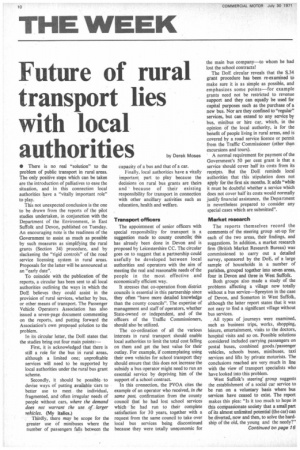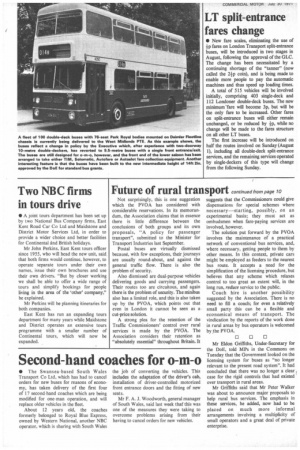Future of rural transport lies with local
Page 12

Page 18

If you've noticed an error in this article please click here to report it so we can fix it.
authorities by Derek Moses
• There is no real "solution" to the problem of public transport in rural areas. The only positive steps which can be taken are the introduction of palliatives to ease the situation, and in this connection local authorities have a "vitally important role" to play.
This not unexpected conclusion is the one to be drawn from the reports of the pilot studies undertaken, in conjunction with the Department of the Environment, in East Suffolk and Devon, published on Tuesday. An encouraging note is the readiness of the Government to assist as much as possible by such measures as simplifying the rural grants (Section 34) procedure, and by slackening the "rigid controls" of the road service licensing system in rural areas. Proposals for the latter will be announced at an "early date".
To coincide with the publication of the reports, a circular has been sent to all local authorities outlining the ways in which the DoE believes they could assist in the provision of rural services, whether by bus, or other means of transport. The Passenger Vehicle Operators Association has also issued a seven-page document commenting on the reports, and putting forward the Association's own proposed solution to the problem.
In its circular letter, the DoE states that the studies bring out four main points:— First, it is acknowledged that there is still a role for the bus in rural areas, although a limited one; unprofitable services will need to be supported by local authorities under the rural bus grant scheme.
Secondly, it should be possible to devise ways of putting available cars to better use to meet the individual, fragmented, and often irregular needs of people without cars, where the demand does not warrant the use of larger vehicles. (My italics.) Thirdly, there may be scope for the greater use of minibuses where the number of passengers falls between the capacity of a bus and that of a car.
Finally, local authorities have a vitally important part to play because the decisions on rural bus grants are theirs and ' because of their existing responsibility for transport in connection with other ancillary activities such as education, health and welfare.
Transport officers
The appointment of senior officers with special responsibility for transport is a suggestion made to county councils; this has already been done in Devon and is proposed by Leicestershire CC. The circular goes on to suggest that a partnership could usefully be developed between local authorities and operators with the aim of meeting the real and reasonable needs of the people in the most effective and economically efficient way.
It stresses that co-operation from district councils is essential in this partnership since they often "have more detailed knowledge than the county councils". The expertise of management and staff of operators, whether State-owned or independent, and of the officers of the Traffic Commissioners, should also be utilized.
The co-ordination of all the various interests in rural transport should enable local authorities to limit the total cost falling on them and get the best value for their outlay. For example, if contemplating using their own vehicles for school transport they should ensure that this does not increase the subsidy a bus operator might need to run an essential service by depriving him of the support of a school contract.
In this connection, the PVOA cites the example of an operator who received, in the same post, confirmation from the county council that he had lost school services which he had run to their complete satisfaction for 30 years, together with a request from the same council to take over local bus services being discontinued because they were totally uneconomic for the main bus company—to whom he had lost the school contracts!
The DoE circular reveals that the S.34 grant procedure has been re-examined to make sure it is as simple as possible, and emphasizes some points—for example grants need not be restricted to revenue support and they can equally be used for capital purposes such as the purchase of a new bus. Nor are they confined to "regular" services, but can extend to any service by bus, minibus or hire car, which, in the opinion of the local authority, is for the benefit of people living in rural areas, and is covered by a road service licence or permit from the Traffic Commissioner (other than excursions and tours).
A normal requirement for payment of the Government's 50 per cent grant is that a service should cover half its costs from its receipts. But the DoE reminds local authorities that this stipulation does not apply for the first six months. It adds "while it must be doubtful whether a service which does not cover half its costs would normally justify financial assistance, the Department is nevertheless prepared to consider any special cases which are submitted".
Market research
The reports themselves record the comments of the steering group set-up for each of the two areas, their findings, and suggestions. In addition, a market research firm (British Market Research Bureau) was commissioned to carry out a detailed survey, sponsored by the DoE, of a large sample of households in a number of parishes, grouped together into seven areas, four in Devon and three in West Suffolk.
Both groups also made a study of the problems affecting a village now totally without a bus service--Spreyton in the case of Devon, and Somerton in West Suffolk, although the latter report states that it was not easy to find a significant village without bus services.
All types of journeys were examined, such as business trips, works, shopping, leisure, entertainment, visits to the doctors, hospital visits and so on. Possible solutions considered included carrying passengers on postal buses, combined goods/passenger vehicles, schools buses, minibuses, taxi services and lifts by private motorists. The conclusions reached are very much in line with the view of transport specialists who have looked into this problem.
West Suffolk's steering" group suggests the establishment of a social car service to be run on a voluntary basis where bus services have ceased to exist. The report makes this plea: "Is it too much to hope in this compassionate society that a small part of its almost unlimited potential (the car) can be diverted, now and then, to solve the hardship of the old, the young and the needy?" Not surprisingly, this is one suggestion which the PVOA has considered with considerable reservations. In its memorandum, the Association claims that in essence there is little difference between the conclusions of both groups and its own proposals, "A policy for passenger transport", submitted to the Minister for Transport Industries last September.
Postal buses are virtually dismissed because, with few exceptions, their journeys are usually round-about, and against the general traffic flow. There is also the problem of security.
Also dismissed are dual-purpose vehicles delivering goods and carrying passengers. Their routes too are circuitous, and again there is the problem of security. The minibus also has a limited role, and this is also taken up by the PVOA, which points out that even in London it cannot be seen as a cut-price solution.
A strong plea for the retention of the Traffic Commissioners' control over rural services is made by the PVOA. The Association considers their retention as "absolutely essential" throughout Britain. It suggests that the Commissioners could give dispensations for special schemes where necessary—starting, possibly, on an experimental basis; they must act as ombudsmen when fare-paying services are involved, however.
The solution put forward by the PVOA involves the maintenance of a practical network of conventional bus services, and, where necessary, getting people to them by other means. In this context, private cars might be employed as feeders to the nearest bus route. It accepts a need for the simplification of the licensing procedure, but believes that any scheme which relaxes control to too great an extent will, in the long run, reduce service to the public.
Coach hire is another possibility suggested by the Association. There is no need to fill a coach; for even a relatively small party this can be a flexible and economical means of transport. The vindication by the reports of the work done in rural areas by bus operators is welcomed by the PVOA.
Mr Eldon Griffiths, Under-Secretary for the DoE, told MPs in the Commons on Tuesday that the Government looked on the licensing system for buses as "no longer relevant to the present road system". It had concluded that there was no longer a clear case for the rigid controls that had existed over transport in rural areas.
Mr Griffiths said that Mr Peter Walker was about to announce major proposals to help rural bus services. The emphasis in these services, he added, now had to be placed on much more informal arrangements involving a multiplicity of small operators and a great deal of private enterprise.




















































































